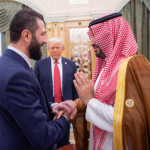Tensions regarding immigration in Ireland have been on the rise recently, with far-right groups exploiting the issue. A protest against immigration in Dublin attracted hundreds of participants, chanting slogans against immigrants and causing traffic disruptions. This is part of a series of anti-immigration demonstrations in the country that have increased over the past year. These tensions have been fueled by incidents such as a mob setting fire to a tent city of immigrants in Dublin and a riot instigated by far-right individuals. Justice Minister Helen McEntee has expressed concern over the uptick in asylum seekers crossing into Ireland from Northern Ireland, some of whom fear being sent to Rwanda under a new British government scheme.
The protest in Dublin was met with a small counter-protest, with police officers keeping the two groups separated. This demonstration is just one of many anti-immigration protests that have taken place in Ireland, reflecting a growing sentiment against immigrants in the country. Incidents such as the mob setting fire to a tent city of immigrants and a riot outside a school involving a man of Algerian descent have heightened tensions and led to increased scrutiny on the country’s immigration and integration policies. The Irish government’s attempts to address the issue by proposing to send some asylum seekers back across the UK-Ireland border have been met with resistance from the UK government.
The rising tensions over immigration in Ireland have been exacerbated by far-right groups exploiting the country’s chronic housing shortage to stir up grievances against non-Irish residents, particularly Muslims and recent arrivals. This has led to incidents such as the mob setting fire to a tent city of immigrants and a riot outside a school involving a man of Algerian descent. The government’s proposal to send some asylum seekers back to the UK for processing has been met with resistance, further complicating the situation. Police in Ireland have been faced with challenges in addressing these issues and maintaining order amidst the rising tensions.
Justice Minister Helen McEntee has raised concerns over the increasing number of asylum seekers crossing into Ireland from Northern Ireland, with many fearing being sent to Rwanda under a new British government scheme. The UK government’s refusal to accept migrants back from any EU country, including Ireland, has further complicated the issue. Asylum seekers in Ireland continue to face uncertainty and challenges as the government grapples with finding a solution to the influx of immigrants. These developments reflect a broader trend of rising tensions surrounding immigration in Ireland and highlight the need for nuanced and comprehensive policies to address the issue.
The recent demonstrations in Ireland against immigration have brought to light the growing tensions over the issue in the country. Far-right groups have capitalized on the chronic housing shortage and other grievances to stoke anti-immigrant sentiments, leading to incidents of violence and unrest. The government’s efforts to address the influx of asylum seekers have been met with challenges, particularly in light of the UK government’s stance on accepting migrants back from Ireland. Justice Minister Helen McEntee’s concerns over the situation underscore the need for a coordinated and effective approach to immigration policy in Ireland. As the country grapples with these challenges, it is crucial for policymakers to prioritize the safety and well-being of all residents, regardless of their background or nationality. By addressing the root causes of tensions and seeking sustainable solutions, Ireland can work towards fostering a more inclusive and diverse society for all its residents.











